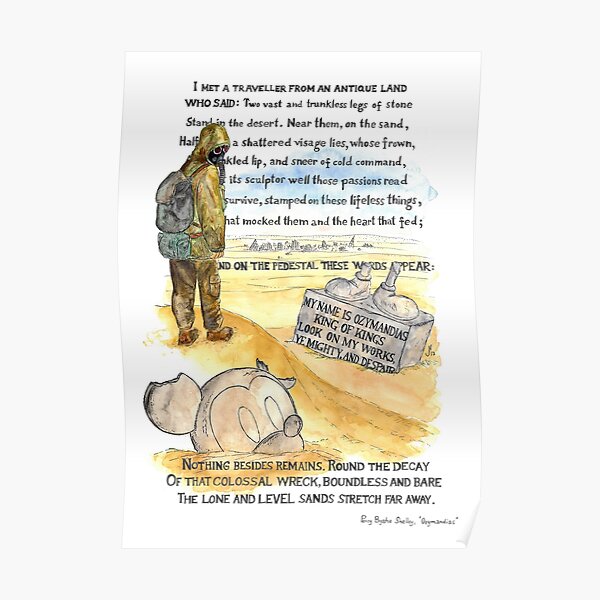

How does the author create irony here? What specific words does he use that make the poem particularly ironic? Be sure to tell me how the words you choose answer this question. The inscription thus symbolised the irony of Ozymandias’ claims to greatness and power, which have been disproved by the passage of time on the pedestal.Trunkless: In this case, a body lacking a torso.A couple of difficult words before we start:.Verbal Irony: Saying one thing and meaning another.Situational Irony: The outcome of a situation drastically upsets readers’ expectations.Now his very own word is mocking on his vain pride and arrogance. It was written in 1817 and is still recognized today as its meaning still holds true. The shattered and ruined statue of Ozymandias is itself a glaring example of irony as it was engraved with the word Look upon my work, ye mighty. Ozymandias Analysis The poem Ozymandias is considered one of Percy Bysshe Shelley’s best sonnets. Dramatic irony: The reader knows something the characters don’t. Ozymandias composed by Percy Shelley is a masterpiece establishing the philosophy of life through irony and sarcasm.Irony occurs when "a discrepancy exists between two levels of meaning and experience." Ozymandias summary Tone, Ironic, declamatory Key themes, Mortality and passage of time the transience of power Meaning, The speaker in the poem describes.If the work contains literary allusions, how do those allusions function within the confines of the poem?.Is this work internally consistent? How does it maintain that consistency?.What are some of the tensions in this work (between ideas, between forces, between people…)? How do the things discussed above (rhyme, sound patterns, imagery, etc) create, then heighten or lessen those tensions?.This resource can be used by students on Google Drive or Google Classroom. How do individual word choices, sound patterns, and other literary devices combine to create this effect? Ozymandias Poetry Annotation and Analysis - Theme, Conceit, Irony.What are the effects produced by this work? (Formalists differentiate between effects and feelings.) For example, they might be drawn to the way Robert Browning cleverly unfolds the story of "My Last Duchess" or the use of irony in "Ozymandias.".

Formalism began in the 1920's as a reaction against the current literary criticism that Formalists thought focused only on the life of the author and concerns outside of the literature itself.are very concerned with sound, form, word choice, literary effects, and "close reading." ("Close reading" is a detailed analysis of the literary effects produced by a work without referring to outside influences.).are mostly unconcerned about historical/cultural context and biographical information about the author.In drawing these vivid and ironic pictures in our minds, Shelley was trying. The statue seems to be saying to any ‘Mighty’ rival emperor who might be tempted to try and invade Rameses’ kingdom: look around you at everything I, Rameses II, have built, and despair of ever vanquishing me or the empire I have made! The grandeur of his kingdom will never be matched, and they should despair of ever trying to equal it.“Ozymandias” and Irony Formalist CriticismĬritical "Lens:" Formalism Formalism assumes that all that is needed in order to interpret a poem or a work of literature is contained within the poem itself. He used very strong imagery and irony to get his point across throughout the poem. The declaration ‘Look on my works, ye Mighty, and despair!’ is supposed to be triumphant, and originally was: when the statue was first built, people gazing at it were meant to look at the empire built by Rameses and be cowed into submission by its vastness and power. Who was Ozymandias? Ozymandias was the Greek name for Rameses II, an Egyptian ruler whose empire crumbled to dust long ago. They are inscribed rather than spoken, but in a sense, the words ‘My name is Ozymandias, king of kings: / Look on my works, ye Mighty, and despair!’ give us a third speaker within this short poem. The inscription ‘Look on my works, ye Mighty, and despair!’ is ironic, for reasons which are worth analysing.


 0 kommentar(er)
0 kommentar(er)
